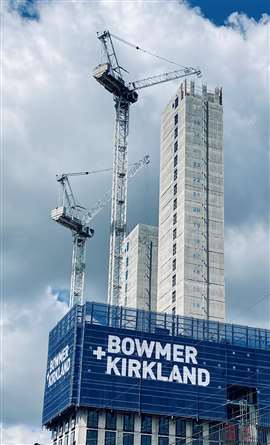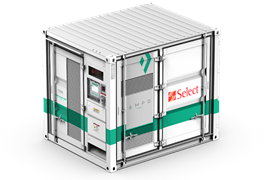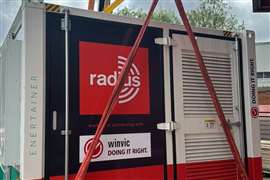Another UK contractor adopts BESS for tower cranes, construction sites
02 October 2024
Replacing diesel generators with battery energy storage systems (BESS) to power construction sites is gaining significant attention, particularly when it comes to tower cranes. This is due in part to recent changes in the UK that have prompted contractors there to reconsider their approach. April 2022, for example, saw the withdrawal of tax relief on diesel fuel used in the construction industry. This caused diesel costs to surge, in some cases as much as two or three times the previous price.
Power Progress recently reported on a construction contractor working in Birmingham, England, that was using BESS to power its construction site. But they are not the only one.
 Construction of the Echo Street student housing blocks in Manchester, England, using two Terex CTL 180 luffing jib tower cranes is powered largely by an Ampd Energy Enertainer BESS. (Photo: Bowmer and Kirkland)
Construction of the Echo Street student housing blocks in Manchester, England, using two Terex CTL 180 luffing jib tower cranes is powered largely by an Ampd Energy Enertainer BESS. (Photo: Bowmer and Kirkland)
UK construction firm Bowmer & Kirkland has adopted BESS as its preferred power solution for cranes, reported Phil Bishop, special contributor to Power Progress’ sister publication Crane & Transport Briefing. Furthermore, the firm has discovered that only a single BESS is needed to effectively power an entire construction site.
One of Bowmer & Kirkland’s projects is a $170 million (£130 million) contract in Manchester, England, for the construction of a dedicated student housing complex. For the project, the company has employed an Enertainer L+ BESS. The unit delivers power to two Terex CTL 180 luffing jib tower cranes, two twin hoists and 11 mast-climbing work platforms (MCWP) — a number expected to rise to 33 at its peak. The BESS also supplies power to site offices, lighting and other electrical needs.
The Enertainer system is named as a combination of “energy” and “container.” It is manufactured by Hong Kong-based Ampd Energy. It is also the BESS system being used on the Birmingham project.
BESS vs. Diesel
Tom Carter, Ampd’s business development manager in the UK, previously worked with Bowmer & Kirkland before joining Ampd. He said the crane specifications for the student housing construction project initially called for a 300 kVA diesel generator for each crane, capable of providing 420 Amps during peak usage in the rare instance that all motors needed to function simultaneously.
A traditional approach using diesel generators would have required two 300 kVA generators for the cranes, two 100 kVA generators for the hoists and three 200 kVA generators for the MCWPs — a combined capacity of 1,660 kVA.
Instead, a single large Enertainer unit provided by rental company Select Plant has been able to provide 2,500 kW of energy per week. The unit is plugged into grid power in a nearby building and receives a 44 Amp trickle charge while providing a nominal current of 663 Amps per minute. The unit has an overload capacity of 795 Amps per minute.
The BESS continuously charges, drawing varying amounts of energy from the grid depending on site activity, and has not yet dropped below 53 percent capacity. Each morning, the Enertainer is back to about 95 percent.
Emissions Reductions
According to Carter, a conventional diesel generator with a capacity of 1,660 kVA would emit 999 metric tons of carbon dioxide (CO2) annually. “We are removing 913 tonnes of this with the Enertainer,” Carter noted — an estimate based on an emissions measure of 0.02 kg of CO2 per kWh of electricity generated, though actual emissions vary depending on the source of electricity.
 The Ampd Enertainer BESS with built in charging and monitoring equipment. (Photo: Select Plant)
The Ampd Enertainer BESS with built in charging and monitoring equipment. (Photo: Select Plant)
If the project had used diesel generators running at 50 percent capacity, they would have consumed around 150 L of diesel per hour, totaling 429,000 L annually. Over the two-year construction phase and nine-month fit-out and commissioning period, the Enertainer BESS is estimated to save over a million liters of fuel.
That unsubsidized fuel could cost between $1.9 and $2.0 million (£1.4 to £1.5 million). By comparison, electricity costs are estimated to be around $67,000 (£50,000) annually, resulting in an estimated cost of approximately $134,000 (£100,000) over the two-year construction phase — a notable financial saving even after accounting for rental costs.
Because not all construction sites have access to a power grid, Carter said off-grid sites could charge the Enertainer using a 60 to 100 kVA generator. For something like the student housing project, this setup would still provide a 60 percent reduction in carbon emissions, he said, AS opposed to the 91 percent carbon savings achieved when connected to the grid.
Additional Benefits
Battery power offers other advantages over diesel, as well. For example, Bowmer & Kirkland previously used BESS instead of diesel generators for a $402 million (£300 million) residential project in the West Bar district of Sheffield, England. Featuring 17 and 19-story buildings, the project was one of the first major UK construction sites to rely solely on battery power. In this case, a Dumarey Peak Power (formerly Punch Power) flywheel system was used to handle energy demand spikes. The absence of a permanent power supply initially threatened to delay the commissioning of the building, but the battery system proved sufficient, allowing the commissioning of five floors of the development.
Bowmer & Kirkland said it is committed to the BESS approach. The company has adopted a policy of using battery power wherever feasible, with 11 batteries in use across different sites. It is now investing in its own equipment, with two Enertainer units on order.
Note: This story was written with the assistance of artificial intelligence (AI)
CONECTAR-SE COM A EQUIPE






